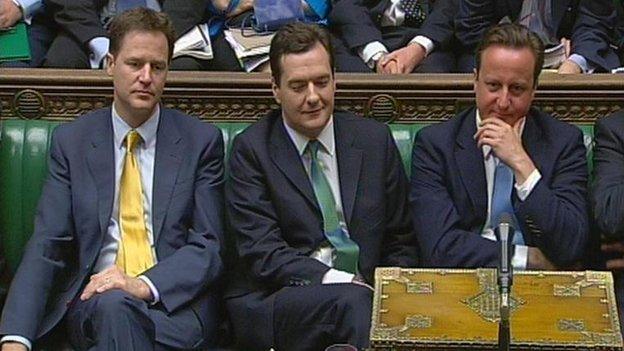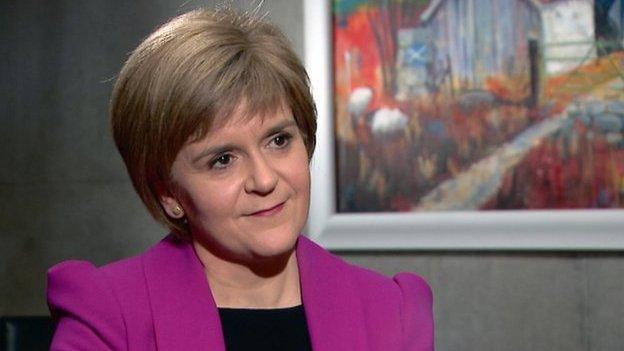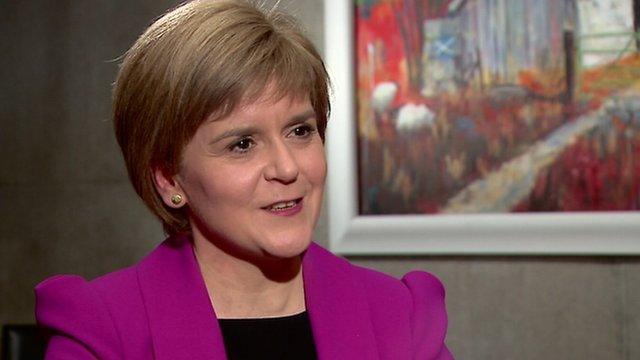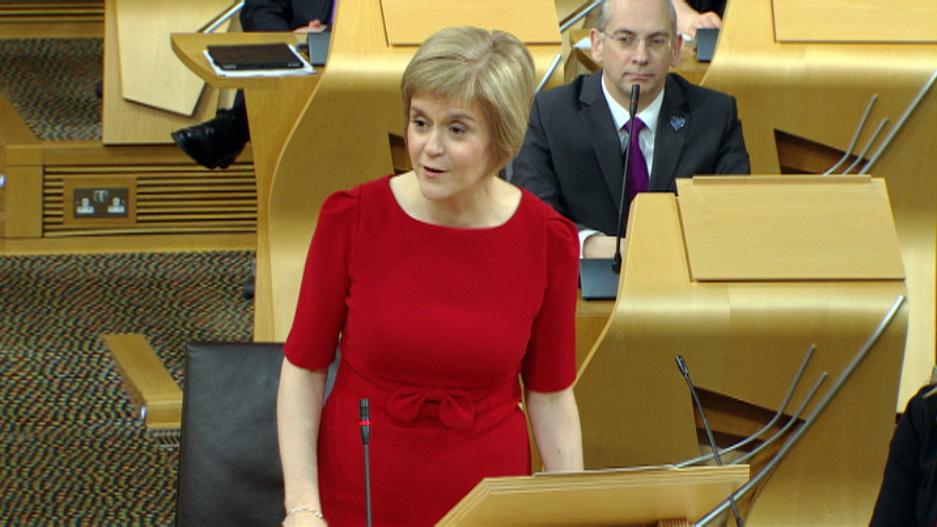Nicola Sturgeon attacks 'Westminster austerity economics'
- Published
Nicola Sturgeon sets out her alternative to what she described as the coalition UK government's "failed" austerity policies.
Scotland's first minister has described the UK government's "austerity economics" as "morally unjustifiable and economically unsustainable".
In a speech in London, Nicola Sturgeon also said a Labour government would have to abandon "failed" austerity policies to win the support of SNP MPs.
Ms Sturgeon revealed that the SNP would back £180bn more spending than the coalition government by 2020.
But the UK government insisted its strategy was working.
Scottish Secretary Alistair Carmichael accused Ms Sturgeon of "trying to turn good news into bad" by suggesting the UK economy was performing poorly when in fact it was "growing strongly".
'Major investments'
He added: "By cutting the deficit in half, we have restored economic credibility, got employment up to record levels, and achieved growth rates that the eurozone and most of the G7 would envy.
"In addition, we have increased pensions, cut income tax for low and middle earners and made major investments in childcare and the NHS.
"Nicola Sturgeon should welcome the progress we have made, in contrast to the economic fortunes suffered by many of our neighbours."
Opinion polls have predicted large gains for the SNP at the general election in May, leading to speculation that the party could hold the balance of power in the event of a hung parliament.
Ms Sturgeon has already ruled out offering any support for the Conservatives.
And she said Labour leader Ed Miliband would need to adopt a "more moderate" approach to deficit reduction if he wanted the backing of SNP MPs in Westminster.
Labour has pledged to "balance the books, but in a fair way" if it wins the election, and has claimed that voting for the SNP "risks letting the Tories back into power".

Douglas Fraser, BBC Scotland business and economy editor
Politically, this is a long way from the red meat of the independence referendum campaign. As the first minister observes, Scotland was told by pro-union campaigners last year that it was equal and valued within the UK, so she is now offering to play a constructive role within it.
A coalition with Labour is not being ruled out. But talk of a deal with Labour - not for coalition but to support it on vital Commons votes that could keep Ed Miliband in power - is being strongly encouraged. Indeed, it appears to be the main plank of the SNP's campaign.
It may be a tricky message to get across to Scottish voters: 'vote SNP to kick out your Labour MP, because Scottish Labour has failed and is out of touch - and then watch the SNP put Ed Miliband into Downing Street'.
The defiant refusal to accept more austerity, which won power for Syriza in Greece last month, is not being offered here. Instead, a serious bid for a share of power in Britain requires a message that won't spook the markets.
Nor is the pitch for a bigger share of Westminster spending coming to Scotland. Not yet, anyway.
The basis for such a deal with the SNP is being gradually set out: no renewal of nuclear weapons, no deal with Tories (a requirement of SNP conference policy), at least the devolution of powers in the Smith Commission, and an end, or at least a softening, of spending cuts to meet progressive priorities.

But Ms Sturgeon said she wanted to break the "cosy consensus" in favour of austerity and instead argued in favour of a "strategy for growth".
She added: "The chancellor is making unprecedented cuts to public spending and the public services of which all of us rely.
"He is doing so in the name of fiscal responsibility, yet his entire economic model depends on individual households taking on more debt than at any time in history.
"Instead of pooling risk, the government is dispersing it to households across the country. Individuals will be deeper in debt, families will feel less secure, the economy will be less resilient.
"I think it is morally unjustifiable and it is economically unsustainable."
'Debt and deficit'
Ms Sturgeon also said it was "simply and manifestly untrue to say that we're all in this together", and argued that the cuts have had a disproportionate impact on women, disabled people and those on low incomes.
Speaking on BBC Radio Scotland ahead of her speech to the Constitution Unit research centre at University College London, Ms Sturgeon said the SNP would support a "modest" increase in public spending of about 0.5% in real terms.
She said: "Debt and deficit would still be falling as a percentage of GDP over these years but we would free up something in the region of £180bn over the UK to invest in infrastructure, in innovation, in growing the economy."
She also told the BBC's political correspondent Iain Watson that it would be "ridiculous" for the Scottish government to increase tax to offset the impact of UK-wide budget cuts.

Chancellor George Osborne (centre) warned at the start of the year that there would be a further £25bn of cuts after the general election
Ms Sturgeon said putting up tax rates, while Scotland remained in the UK, would mean "people in Scotland pay twice".
Holyrood will become responsible for setting income tax rates from April 2016.
Labour's Shadow Scottish Secretary, Margaret Curran, said: "Scotland can't afford another five years of David Cameron, but voting for the SNP risks letting the Tories back into power.
"Every vote for the SNP in May is another boost for David Cameron, and makes it more likely the Tories will be the largest party across the UK after the election. In every election since women got the vote the largest party has gone on to form the government.
"Labour's plan will balance the books, and do it in a fair way, unlike the Tories. We'll reverse the Tories' tax cut for millionaires, we'll grow our economy with a higher minimum wage and we'll tax people with mansions over £2m to pay for 1,000 new nurses in the Scottish NHS."
- Published21 January 2015

- Published21 January 2015

- Published19 November 2014
